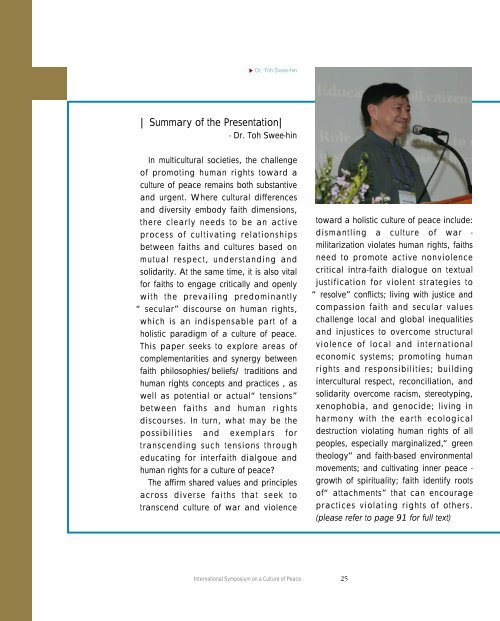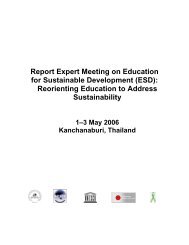Intercultural Understanding and Human Rights Education ... - APCEIU
Intercultural Understanding and Human Rights Education ... - APCEIU
Intercultural Understanding and Human Rights Education ... - APCEIU
You also want an ePaper? Increase the reach of your titles
YUMPU automatically turns print PDFs into web optimized ePapers that Google loves.
▶ Dr. Toh Swee-hin<br />
| Summary of the Presentation|<br />
- Dr. Toh Swee-hin<br />
In multicultural societies, the challenge<br />
of promoting human rights toward a<br />
culture of peace remains both substantive<br />
<strong>and</strong> urgent. Where cultural differences<br />
<strong>and</strong> diversity embody faith dimensions,<br />
there clearly needs to be an active<br />
process of cultivating relationships<br />
between faiths <strong>and</strong> cultures based on<br />
mutual respect, underst<strong>and</strong>ing <strong>and</strong><br />
solidarity. At the same time, it is also vital<br />
for faiths to engage critically <strong>and</strong> openly<br />
with the prevailing predominantly<br />
seculardiscourse on human rights,<br />
which is an indispensable part of a<br />
holistic paradigm of a culture of peace.<br />
This paper seeks to explore areas of<br />
complementarities <strong>and</strong> synergy between<br />
faith philosophies/beliefs/ traditions <strong>and</strong><br />
human rights concepts <strong>and</strong> practices , as<br />
well as potential or actual tensions<br />
between faiths <strong>and</strong> human rights<br />
discourses. In turn, what may be the<br />
possibilities <strong>and</strong> exemplars for<br />
transcending such tensions through<br />
educating for interfaith dialgoue <strong>and</strong><br />
human rights for a culture of peace<br />
The affirm shared values <strong>and</strong> principles<br />
across diverse faiths that seek to<br />
transcend culture of war <strong>and</strong> violence<br />
toward a holistic culture of peace include:<br />
dismantling a culture of war -<br />
militarization violates human rights, faiths<br />
need to promote active nonviolence<br />
critical intra-faith dialogue on textual<br />
justification for violent strategies to<br />
resolveconflicts; living with justice <strong>and</strong><br />
compassion faith <strong>and</strong> secular values<br />
challenge local <strong>and</strong> global inequalities<br />
<strong>and</strong> injustices to overcome structural<br />
violence of local <strong>and</strong> international<br />
economic systems; promoting human<br />
rights <strong>and</strong> responsibilities; building<br />
intercultural respect, reconciliation, <strong>and</strong><br />
solidarity overcome racism, stereotyping,<br />
xenophobia, <strong>and</strong> genocide; living in<br />
harmony with the earth ecological<br />
destruction violating human rights of all<br />
peoples, especially marginalized, green<br />
theology<strong>and</strong> faith-based environmental<br />
movements; <strong>and</strong> cultivating inner peace -<br />
growth of spirituality; faith identify roots<br />
of attachmentsthat can encourage<br />
practices violating rights of others.<br />
(please refer to page 91 for full text)<br />
International Symposium on a Culture of Peace 25








